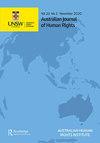标准化代替诉讼:人权倡导者可以从ISO的消费者保护中学到什么?
Q1 Arts and Humanities
引用次数: 0
摘要
摘要自二十世纪末以来,在国家和国际层面,人权话语一直是谴责不公正或表达公正世界的另类愿景的主角。然而,批判的法律学者认为,人权可能提供的东西太少、太晚,尤其是在经济(再)分配问题上。本着这种精神,我探讨了消费者权利激进主义为国际人权运动的捍卫者和批评者提供的可能性。虽然消费者权益组织一直认为自己是人权运动的一部分,但情况并非总是如此。因此,通过强调国际标准化组织(ISO)消费者国际(CI)的工作,我邀请人权倡导者将技术标准化视为推动社会正义的替代战略,这可能比目前的其他方法(如社会经济权利诉讼)更有成效。尽管是非政治化的,但消费者权利提供的工具并不比当代人权倡导者提供的工具更非政治性,而且可能提供了新的方式来挑战野兽腹部的资源分配。本文章由计算机程序翻译,如有差异,请以英文原文为准。
Standardisation instead of litigation: what can human rights advocates learn from consumer protection at the ISO?
ABSTRACT Since the late twentieth century, at both the national and international levels, human rights discourse has been a protagonist in condemnations of injustice or in the articulation of alternative visions of a just world. Critical legal scholarship, however, has argued that human rights might offer too little, too late, especially when it comes to issues of economic (re)distribution. In this vein, I explore the possibilities that consumer rights activism offers to both defenders and critics of the international human rights movement. While consumer rights organisations have always felt part and parcel of the human rights movement, perhaps the opposite has not always been the case. Thus, by highlighting the work of Consumers International (CI) at the International Organization for Standardization (ISO), I invite human rights advocates to think of technical standardisation as an alternative strategy to push for social justice, which might be more productive than other current approaches—such as socio-economic rights litigation. Albeit depoliticising, the tools offered by consumer rights are not much more apolitical than those offered by contemporary human rights advocates, and perhaps offer new ways to challenge the distribution of resources from within the belly of the beast.
求助全文
通过发布文献求助,成功后即可免费获取论文全文。
去求助
来源期刊

Australian Journal of Human Rights
Arts and Humanities-History
CiteScore
1.30
自引率
0.00%
发文量
43
期刊介绍:
The Australian Journal of Human Rights (AJHR) is Australia’s first peer reviewed journal devoted exclusively to human rights development in Australia, the Asia-Pacific region and internationally. The journal aims to raise awareness of human rights issues in Australia and the Asia-Pacific region by providing a forum for scholarship and discussion. The AJHR examines legal aspects of human rights, along with associated philosophical, historical, economic and political considerations, across a range of issues, including aboriginal ownership of land, racial discrimination and vilification, human rights in the criminal justice system, children’s rights, homelessness, immigration, asylum and detention, corporate accountability, disability standards and free speech.
 求助内容:
求助内容: 应助结果提醒方式:
应助结果提醒方式:


